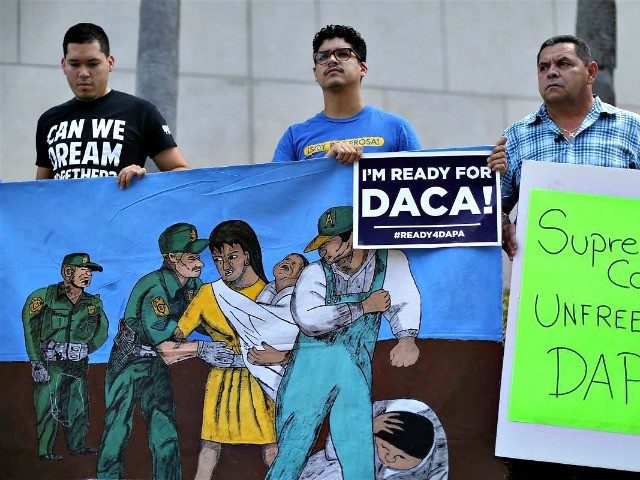On Tuesday, President Trump hosted a rare televised meeting at the White House between Republican and Democratic lawmakers regarding a bill to grant an amnesty for the more than 886,000 illegal aliens covered by President Obama’s illegal DACA (“Deferred Action for Childhood Arrivals”) executive action.
President Trump expressed hope for a deal in which a legislative amnesty for the aliens would be traded for border wall funding, an end to chain migration, an end to the diversity visa lottery, and other law enforcement measures.
Strangely, the meeting was highlighted by Republicans repeating the mantra that “we’ve got to do DACA,” as Representative Kevin McCarthy (R-CA) put it.
But that statement is not only bad negotiating, it’s wrong. We don’t have to do anything for the 886,000 people who enrolled in DACA, or the 3.25 million similar aliens covered by the Democrats’ DREAM Act.
Granting an amnesty to the DACA aliens would be a profoundly bad policy that would hurt American workers and American taxpayers. They are not kids; they are mostly young adults in their 20s and 30s. Their average age is 24. And they are competing for jobs against young Americans in the same age group. Despite the growing economy, young American adults are struggling in the workforce, with an unemployment rate of nine percent. And young Americans without a college degree (66 percent of them) are suffering an underemployment rate (unemployed or seeking full time work) that stands at a whopping 34 percent. Why in the world would we want to give legal status to nearly a million illegal aliens so they can compete against our own citizens in the same age group?
Granting an amnesty would also be very costly to American taxpayers. It’s estimated that the net cost of the DREAM Act amnesty for the larger group of 3.25 million aliens would be $26 billion, even after taking into account any taxes that the aliens would pay. That’s explained, in part, by the fact that about 20 percent would go on food stamps after the amnesty made them eligible for it.
And then there’s the fact that every time an amnesty is granted, it causes a surge in illegal immigration. The new illegal aliens come in either to claim falsely that they were here already (and therefore eligible for the amnesty) or to wait for the next amnesty. We know this empirically. The 1986 amnesty for 2.7 million illegal aliens was followed by a surge in illegal immigration that lasted into the 1990s. It is estimated that 700,000 illegal aliens fraudulently applied for and received the amnesty. That is in addition to the 398,000 fraudulent applications that the INS discovered and rejected.
We also have more recent evidence that amnesties cause a surge in illegal immigration. During the past decade, whenever one house of Congress has passed an amnesty bill or there has been widespread expectation that Congress will enact an amnesty, the Border Patrol has seen an increase in illegal border crossings. In 2013 illegal border crossings more than doubled when the Senate deliberated on the proposed Gang of Eight amnesty. In 2014, according the Government Accountability Office, the original DACA executive amnesty caused a surge in immigration by unaccompanied minors. And in September of 2017, the renewed talk of amnesty coincided with the most recent increase in illegal border crossings.
In sum, it’s clear that a DACA amnesty would do massive damage to our country – taking jobs from young Americans, taking money from American taxpayers, and causing a new wave of illegal immigration. Such an amnesty could only be justified if the benefits exceeded the costs. The only way to get there is to compensate for the amnesty with a large number of legislative changes to restore the rule of law. Any amnesty would have to be accompanied by not only wall funding, an end to chain migration, and ending the diversity visa lottery (what the President said he wants) – but also by a mandate requiring all employers to use E-Verify to ensure that they are hiring only U.S. citizens or aliens with employment authorization.
The Democrats are apparently a long way from agreeing to such a deal. Senator Diane Feinstein (D-CA), for example, said she wants a “clean” bill, meaning an amnesty with nothing else attached. If other Democrats take this position, Republicans will need to hold firm in insisting that an amnesty needs be counterbalanced by all of the law enforcement measures listed above. They will also need to be willing to walk away from a bad deal. Breathlessly insisting that “we’ve got to do DACA” doesn’t help.
Complicating the picture further was the President’s statement that “when this group comes back … with an agreement, I’m signing it. I mean, I will be signing it. I’m not going to say, ‘Oh, gee, I want this or I want that.’ I’ll be signing it….” As a matter of bargaining, the President appeared to be giving away any leverage that he had. But perhaps the President is one step ahead. It may be that he knows that Congress won’t be able to agree on the terms a deal, and he’s making clear that the failure can’t be attributed to him.
Either way, Republican Members of Congress are going to need to hold firm. And they need to be willing to walk away from a bad deal. If they lose their nerve, their constituents will need to remind them: we don’t have to do amnesty.
Kris W. Kobach is the elected secretary of state of Kansas. An expert in immigration law and policy, he coauthored the Arizona SB-1070 immigration law and represented in federal court the 10 ICE agents who sued to stop Obama’s 2012 DACA amnesty. During 2001-03, he was Attorney General Ashcroft’s chief adviser on immigration law at the Department of Justice. He is also a 2018 candidate for the office of governor of Kansas. His website is kriskobach.com.

COMMENTS
Please let us know if you're having issues with commenting.